Essential Oils For Depression: Benefits, Risks & How To Use 2024

Essential oils have been used therapeutically for centuries. Essential oils are complex mixtures of dynamic, fragrant compounds with many health benefits. These concentrated plant extracts protect against bacteria, fungi, viruses, inflammation, and pain and can promote relaxation, improve sleep, and stimulate the brain.
Recent research has focused on using essential oils as alternative therapies to battle depression. Neurologists are beginning to identify the pathways[1] through which these compounds affect mood, stress hormone levels, neurotransmitters, and, remarkably, even the growth and development of new neurons. These studies[2] show that essential oils can provide powerful relief from the symptoms of many mental disorders, including depression.
Depression affects[3] approximately 5% of the population globally and is a significant cause of disability. While there are many acceptable treatments for depression, some have side effects, such as antidepressants. Essential oils offer a safe alternative to medication. Or use them as part of a total treatment plan.
Do Essential Oils Work For Depression?
Yes, essential oils can help treat symptoms of depression. Depression is a serious mental health condition that often requires treatment with prescription medication and therapy. Still, essential oils are a natural remedy that can help alleviate symptoms of depression and mood disorders. Antidepressants are not used[3] for mild depression, but essential oils could be very helpful in these cases.
The symptoms of depression include low mood, decreased interest in or pleasure from previously enjoyable activities, sleep disruptions, changes in appetite, feelings of guilt and/or worthlessness, difficulty concentrating, and hopelessness. Depression can make working, going to school, interacting with others, and self-care nearly impossible, and, for some, the suffering can lead to substance abuse and suicide. Research[4] has shown that using essential oils as a complementary therapy,[5] in addition to medication and/or therapy, can aid recovery from depression.
How Do Essential Oils Work?
Inhaling essential oils into the nasal cavity activates specialized receptors that transmit messages along the olfactory nerve directly to the limbic system. The limbic system is the brain’s emotional center, so this direct connection allows essential oils to impact mood strongly. Essential oil molecules can also be absorbed into the bloodstream, cross the blood-brain barrier, and influence specific brain regions.
Benefits
Research suggests that essential oils can reduce depressive symptoms by:
- Decreasing negative mood.
- Increasing positive mood.
- Decreasing stress hormones.
- Improving sleep.
- Regulating neurotransmitters like serotonin and dopamine.
- Decreasing anxiety and agitation.
- Decreasing activation of the sympathetic nervous system to lower blood pressure.
- Increasing parasympathetic nervous system activation promotes relaxation and a return to equilibrium.
- Enhancing cognitive abilities, including memory and attention.
What Essential Oils Are Good For Depression?
Research[2] suggests that the best essential oils for depression treatment[6] are:
- Rosemary oil.
- Lavender oil.
- Bergamot oil.
- Sage oil.
- Yuzu oil.
- Chamomile oil.
Rosemary Oil
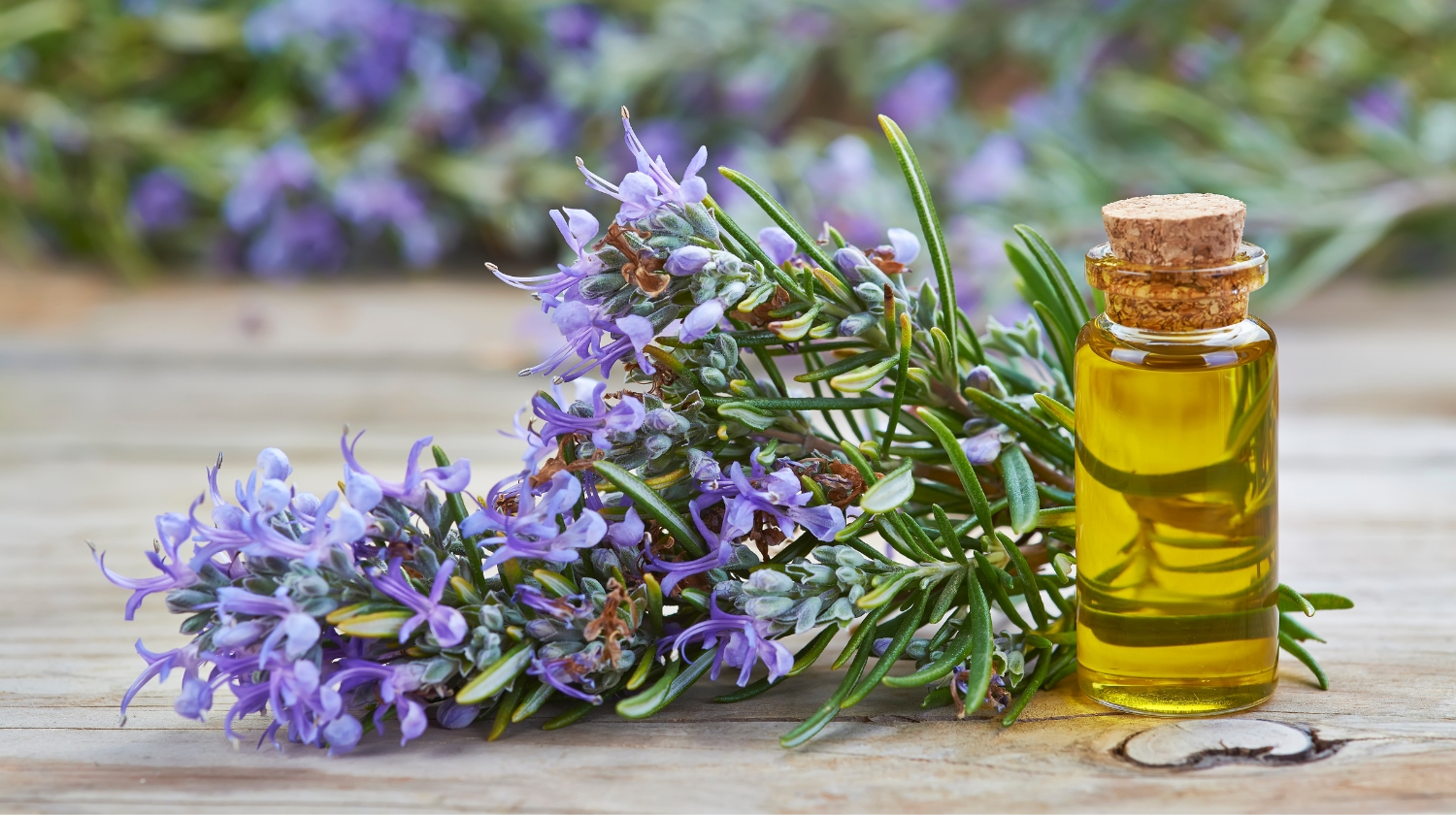
One study[7] showed that aromatherapy with rosemary oil significantly decreased depression among ambulance technicians. These results are important, as this is an occupation associated with high burnout rates and substantial mental distress. These researchers noted that rosemary oil had been shown to increase dopamine, serotonin, and norepinephrine, all neurotransmitters that can be disrupted by depression.
A randomized clinical trial[8] demonstrated that aromatherapy with rosemary oil decreased depression among university students. Enhanced performance on memory tasks, lower levels of anxiety, and improvements in sleep quality were also observed for students who received this aromatherapy. This provides scientific evidence that, in addition to lifting mood, rosemary essential oil can be used to promote relaxation and combat other symptoms frequently experienced during the depression.
Lavender Oil
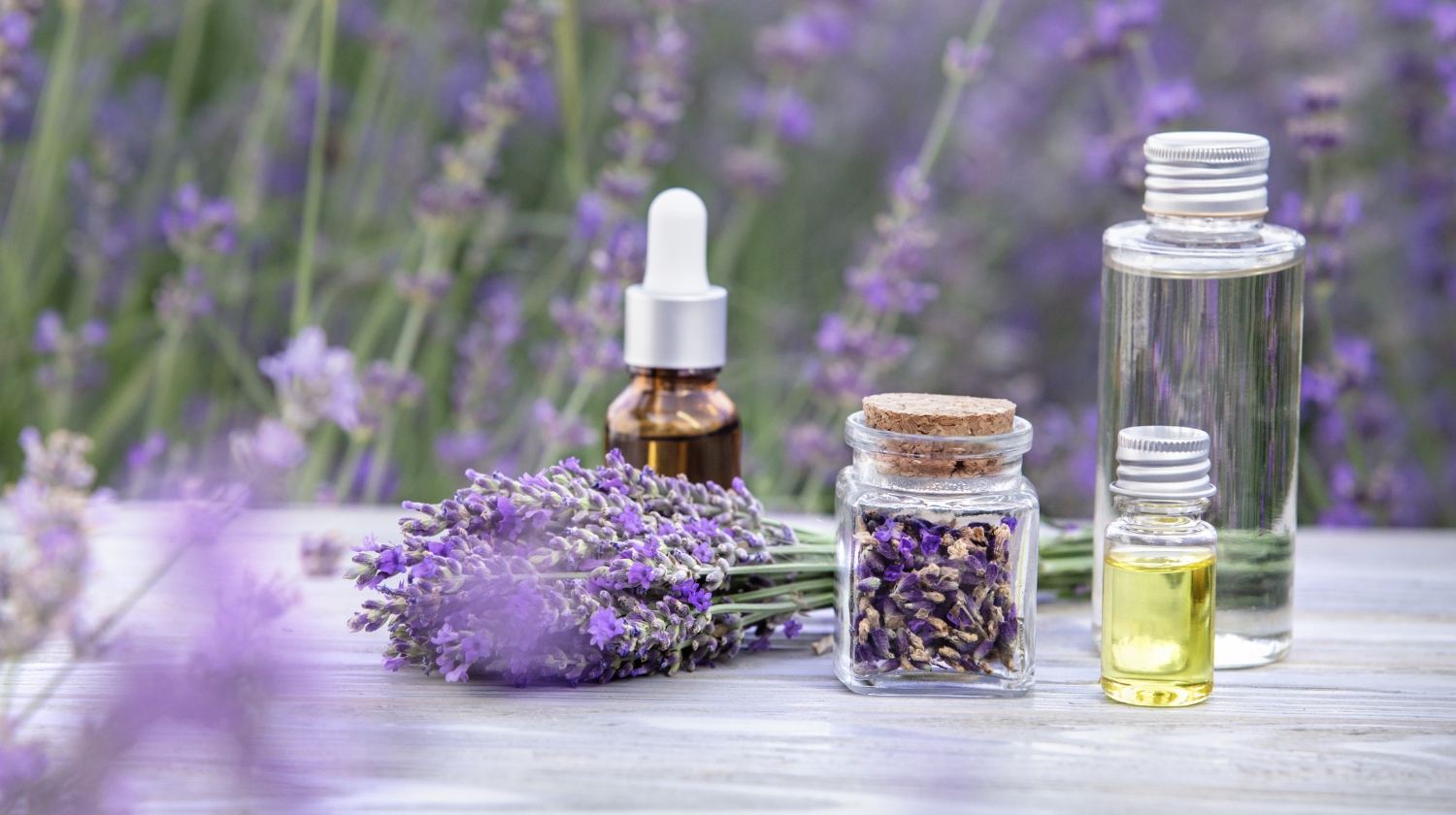
A study[9] investigating the impact of adding lavender oil capsules to traditional pharmacological treatment of depression showed that patients who also received this alternative therapy showed more significant improvements in depression than those treated with medication alone. They also experienced reduced anxiety, decreased agitation, and decreased sleep disturbances. This shows that adding this oil for depression can complement more conventional depression treatments.
Additionally, a randomized controlled trial[10] revealed that lavender aromatherapy relieved certain premenstrual syndrome symptoms, including anxiety, depressive affect, nervousness, pain, and bloating.
A systematic review[11] of nine studies investigating lavender oil administered by inhalation or massage concluded that this oil is beneficial when used as a complementary therapy for mild to moderate depression. In addition, sleeplessness, which often accompanies depression, is relieved[12] with the use of lavender oil.
Bergamot Oil
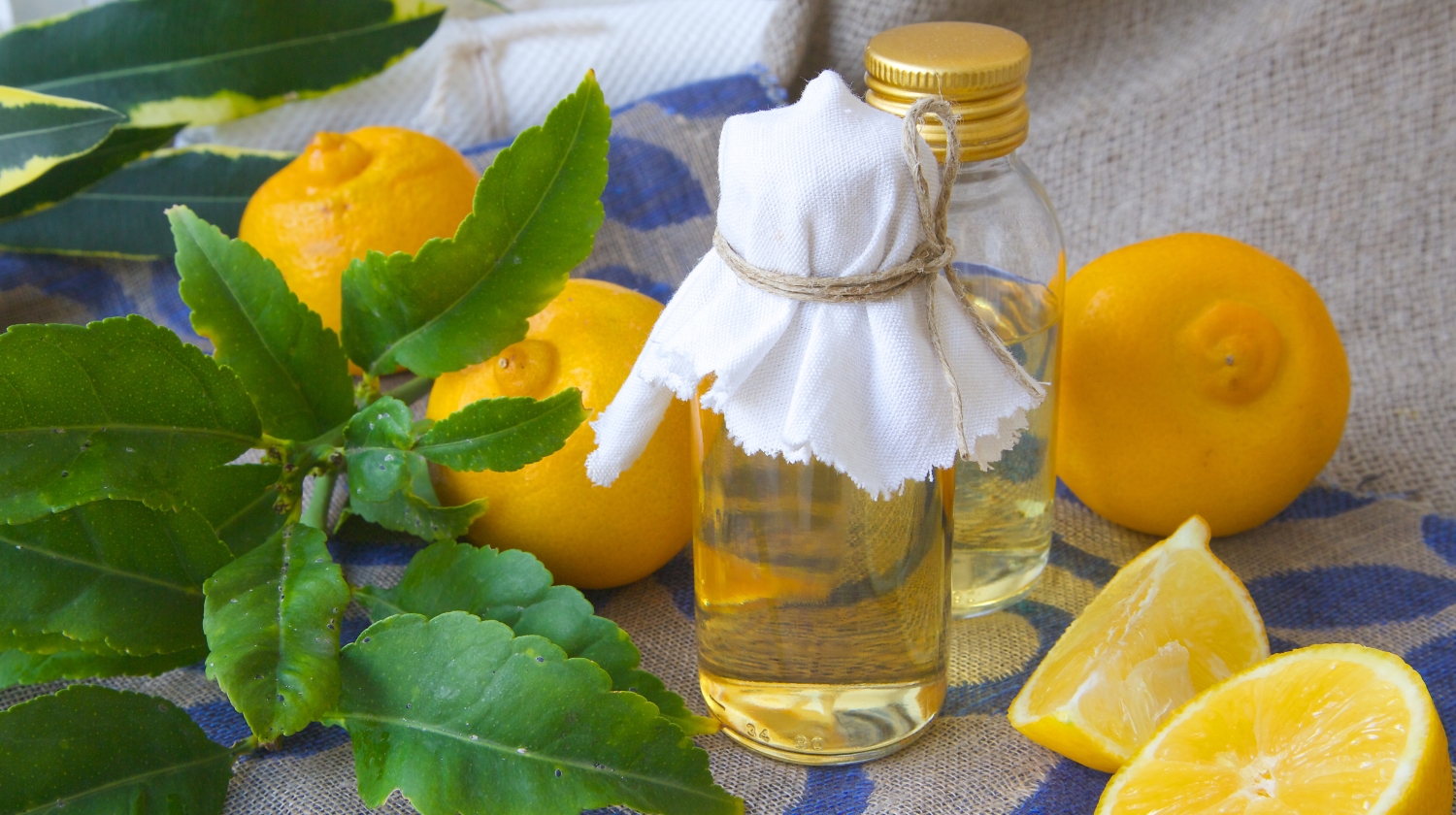
A randomized controlled trial[13] demonstrated that aromatherapy with bergamot essential oil was associated with significantly lower levels of depressed mood in postpartum women. These researchers concluded that bergamot oil might be useful for preventing postpartum depression. Another study showed that diffusion of bergamot oil in a waiting room at a mental health treatment center led to significant increases in positive mood.[13]
Additionally, in a study of healthy women,[14] inhaling bergamot oil diffused in water increased mood and significantly decreased cortisol levels in their saliva. Cortisol is a stress hormone that is frequently elevated in people with depression, whose sympathetic nervous systems are in overdrive. These results suggest that bergamot essential oil may effectively calm the flight-or-fight response that prevails during states of anxiety and depression.
Sage Oil

A study of menopausal women[15] showed that inhalation of sage essential oil was associated with lower cortisol levels and increased serotonin levels. This has important implications for using sage to relieve symptoms of depression, as high cortisol and low serotonin are key components of depression.
The beneficial effects of sage essential oil on cognition are well-established. In a systematic review[16] of these studies, researchers concluded that interventions using sage oil enhanced cognitive performance in healthy people and those with neurodegenerative diseases. This is relevant for depression, which is often associated with cognition difficulties, like memory, attention, and decision-making impairments.
Yuzu Oil
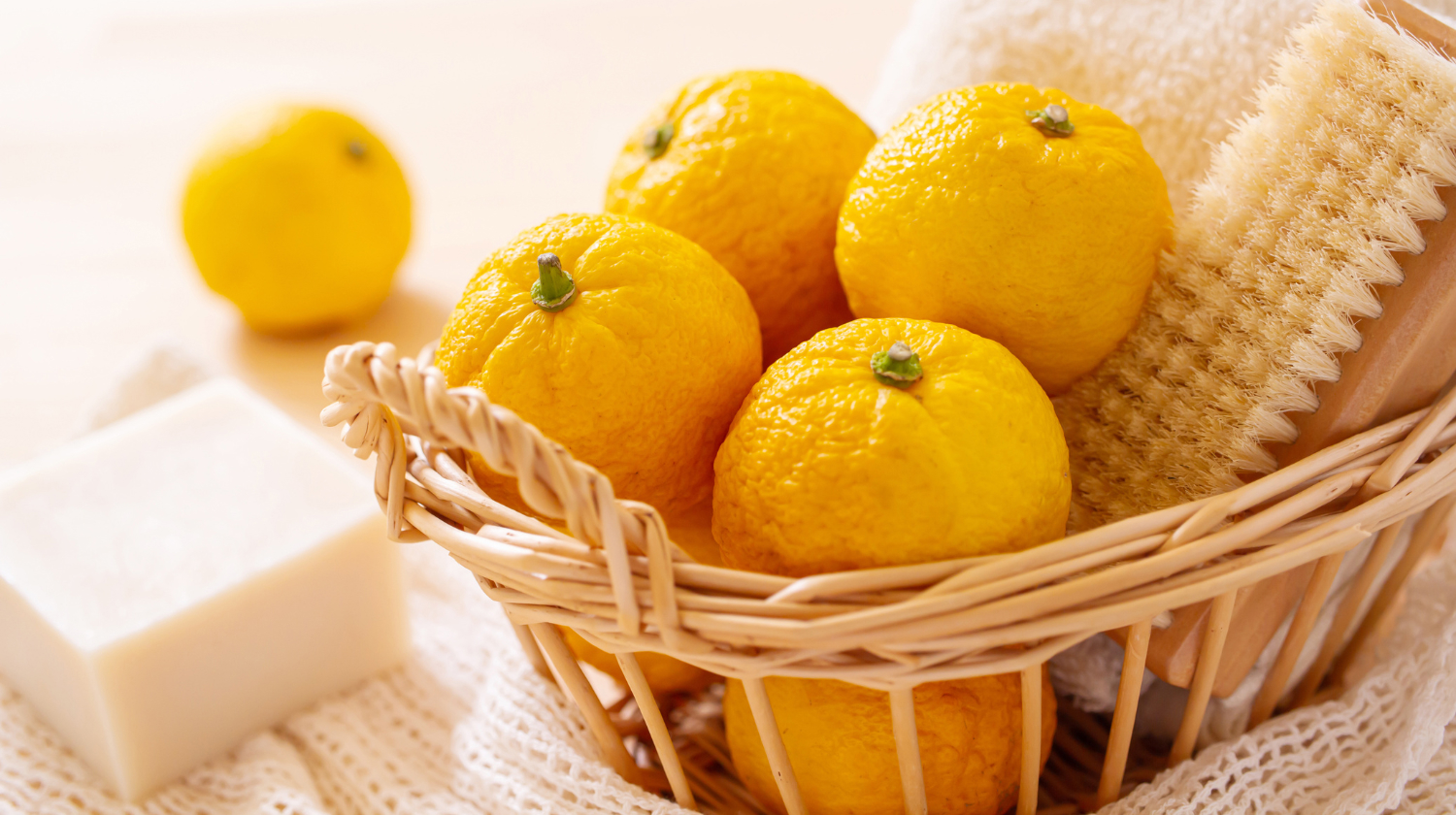
A study demonstrated that aromatherapy with yuzu essential oils[17] alleviated negative emotional states marked by depression, anxiety, hostility, and confusion. Additionally, this study revealed that yuzu oil decreased salivary chromogranin A, or CgA, which is an endocrinologic stress marker. Decreases in CgA reflect a dampening of the sympathetic nervous system, which is often overactive in depression.
Similarly, a randomized controlled study[18] investigating using yuzu essential oils during the menstrual cycle showed decreased mood disturbance, tension, anxiety, and fatigue following aromatherapy. Moreover, yuzu aromatherapy was associated with decreased heart rate and higher heart rate variability (a high heart rate variability shows better performance under stress); these findings reflect an increase in the activity of the parasympathetic nervous system, which is responsible for restoring balance and equilibrium following stress.
Chamomile Oil
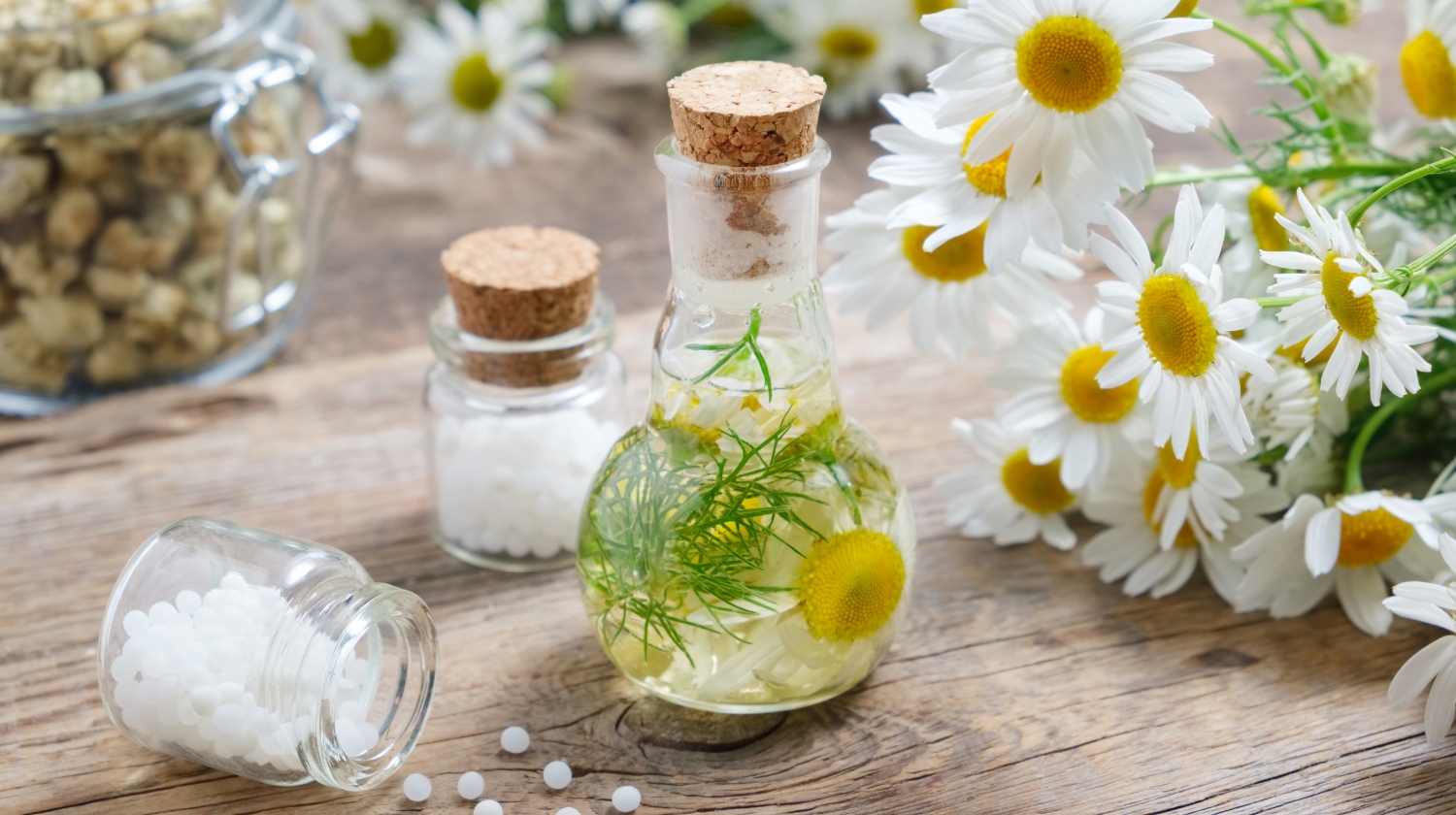
A randomized controlled trial[19] of older adults showed that aromatherapy with chamomile essential oils resulted in decreased depression, anxiety, and stress compared to a control group. Additionally, in a 2022 review article,[20] researchers specified that inhalation of chamomile essential oil reduced neuroinflammation, and brain-derived neurotrophic factor or BDNF, which impacts the serotonin system and other neuropathways involved in depression and anxiety.
Warning And Side Effects
The Food and Drug Administration does not regulate essential oils. High-quality oils are produced via distillation without additives or chemical fillers; the ingredients should include only therapeutic-grade essential oil(s) and carrier oil, like almond oil. After deciding to buy essential oils, research available options to find the best ones based on purity and quality.
Essential oils can cause an allergic reaction or skin reaction, so conduct a patch test on a small section of the forearm before applying it more broadly or using it in an aromatherapy massage. Do not ingest essential oils. As with any medication or supplement, consult a healthcare provider, such as a registered dietitian nutritionist knowledgeable in integrative medicine therapies, before using essential oils.
A healthcare professional should supervise the use of essential oils by pregnant people, those with respiratory conditions, and young children. Be mindful of pets when using essential oils, as they can be toxic if ingested.
How To Use Essential Oils For Depression
The most common method of using essential oils is aromatherapy. The simplest way to use essential oils is to inhale the scent directly from the essential oil vial. They can also be added to a diffuser, which disperses a fragrant mist into the air. Another method is to add a few drops to a cotton ball for fragrance inhalation. Add a few drops to the bath for a relaxing and fragrant aromatherapy experience that can help relieve stress. Additionally, essential oils can be applied to the skin if they have been diluted with a carrier oil like almond, coconut, or olive oil. They can also be used with massage oils.
Experiment with various essential oils for mental health to determine which aromatherapy treatment works best. Certain essential oils can also be blended to maximize their effects. For example, adding yuzu’s balancing, restorative effects to the antidepressant effects of lavender can produce a new essential oil blend for depression and anxiety.
Alternative Treatments For Depression
If you notice that a friend or loved one is exhibiting depression-like behaviors, such as self-isolating, exhibiting a persistent sad or depressed mood, or no longer participating in activities, this may indicate that they are suffering from depression. You can help them locate information and resources through the National Institutes of Health[21] or the National Alliance on Mental Illness.[22] Several medications have demonstrated effectiveness in treating depression, including selective serotonin reuptake inhibitors. Additionally, psychological therapies like cognitive behavioral therapy, mindfulness-based cognitive therapy, and interpersonal psychotherapy are effective treatments for depression. Many of these therapies are available in online formats.
Conclusion
Depression is a serious psychological disorder that causes tremendous suffering. Essential oils can be valuable tools to add to the treatment repertoire and can be combined with medications and therapy to fight depression.
+ 22 sources
Health Canal avoids using tertiary references. We have strict sourcing guidelines and rely on peer-reviewed studies, academic researches from medical associations and institutions. To ensure the accuracy of articles in Health Canal, you can read more about the editorial process here
- Fung, T.K.H., Lau, B.W.M., Ngai, S.P.C. and Tsang, H.W.H. (2021). Therapeutic Effect and Mechanisms of Essential Oils in Mood Disorders: Interaction between the Nervous and Respiratory Systems. International Journal of Molecular Sciences, [online] 22(9), p.4844. doi:https://doi.org/10.3390/ijms22094844.
- Lizarraga‐Valderrama, L.R. (2020). Effects of essential oils on central nervous system: Focus on mental health. Phytotherapy Research, [online] 35(2), pp.657–679. doi:https://doi.org/10.1002/ptr.6854.
- World (2021). Depression. [online] Who.int. Available at: https://www.who.int/news-room/fact-sheets/detail/depression.
- Pitt.edu. (2023). View of A Systematic Review of the Effects of Aromatherapy with Lavender Essential Oil on Depression. [online] Available at: http://cajgh.pitt.edu/ojs/cajgh/article/view/442/306.
- Fißler, M. and Quante, A. (2014). A case series on the use of lavendula oil capsules in patients suffering from major depressive disorder and symptoms of psychomotor agitation, insomnia and anxiety. Complementary Therapies in Medicine, [online] 22(1), pp.63–69. doi:https://doi.org/10.1016/j.ctim.2013.11.008.
- de Sousa, D., Silva, R., Silva, E. and Gavioli, E. (2017). Essential Oils and Their Constituents: An Alternative Source for Novel Antidepressants. Molecules, [online] 22(8), p.1290. doi:https://doi.org/10.3390/molecules22081290.
- Seyyedeh Masoomeh Hatami, Nasim Mehrpooya, Seyyed Abolfazl Vagharseyyedin and Hossein Rahimi (2020). Effect of Aromatherapy with Rosemary Essential Oil on Occupational Fatigue and Depression Experienced by Ambulance Technicians. Herbal Medicines Journal (Herb Med J), [online] 5(2), pp.76–84. doi:https://doi.org/10.22087/hmj.v5i2.803.
- Nematolahi, P., Mehrabani, M., Karami-Mohajeri, S. and Dabaghzadeh, F. (2018). Effects of Rosmarinus officinalis L. on memory performance, anxiety, depression, and sleep quality in university students: A randomized clinical trial. Complementary Therapies in Clinical Practice, [online] 30, pp.24–28. doi:https://doi.org/10.1016/j.ctcp.2017.11.004.
- Fißler, M. and Quante, A. (2014). A case series on the use of lavendula oil capsules in patients suffering from major depressive disorder and symptoms of psychomotor agitation, insomnia and anxiety. Complementary Therapies in Medicine, [online] 22(1), pp.63–69. doi:https://doi.org/10.1016/j.ctim.2013.11.008.
- Uzunçakmak, T. and Ayaz Alkaya, S. (2018). Effect of aromatherapy on coping with premenstrual syndrome: A randomized controlled trial. Complementary Therapies in Medicine, [online] 36, pp.63–67. doi:https://doi.org/10.1016/j.ctim.2017.11.022.
- Jafari-Koulaee, A., Elyasi, F., Taraghi, Z., Ilali, E.S. and Moosazadeh, M. (2020). A Systematic Review of the Effects of Aromatherapy with Lavender Essential Oil on Depression. Central Asian Journal of Global Health, [online] 9(1). doi:https://doi.org/10.5195/cajgh.2020.442.
- Yıldırım, D., Kocatepe, V., Can, G., Sulu, E., Akış, H., Şahin, G. and Aktay, E. (2020). The Effect of Lavender Oil on Sleep Quality and Vital Signs in Palliative Care: A Randomized Clinical Trial. Complementary Medicine Research, [online] 27(5), pp.328–335. doi:https://doi.org/10.1159/000507319.
- CHEN, M.-L., CHEN, Y.-E. and LEE, H.-F. (2022). The Effect of Bergamot Essential Oil Aromatherapy on Improving Depressive Mood and Sleep Quality in Postpartum Women: A Randomized Controlled Trial. Journal of Nursing Research, [online] 30(2), p.e201. doi:https://doi.org/10.1097/jnr.0000000000000459.
- Watanabe, E., Kuchta, K., Kimura, M., Rauwald, H.W., Kamei, T. and Imanishi, J. (2015). Effects of Bergamot (Citrus bergamia (Risso) Wright & Arn.) Essential Oil Aromatherapy on Mood States, Parasympathetic Nervous System Activity, and Salivary Cortisol Levels in 41 Healthy Females. Complementary Medicine Research, [online] 22(1), pp.43–49. doi:https://doi.org/10.1159/000380989.
- Lee, K.-B., Cho, E. and Kang, Y.-S. (2014). Changes in 5-hydroxytryptamine and Cortisol Plasma Levels in Menopausal Women After Inhalation of Clary Sage Oil. Phytotherapy Research, [online] 28(11), pp.1599–1605. doi:https://doi.org/10.1002/ptr.5163.
- Miroddi, M., Navarra, M., Quattropani, M.C., Calapai, F., Gangemi, S. and Calapai, G. (2014). Systematic Review of Clinical Trials Assessing Pharmacological Properties ofSalviaSpecies on Memory, Cognitive Impairment and Alzheimer’s Disease. CNS Neuroscience & Therapeutics, [online] 20(6), pp.485–495. doi:https://doi.org/10.1111/cns.12270.
- The Journal of Alternative and Complementary Medicine. (2021). Effects of Olfactory Stimulation from the Fragrance of the Japanese Citrus Fruit Yuzu (Citrus junos Sieb. ex Tanaka) on Mood States and Salivary Chromogranin A as an Endocrinologic Stress Marker | The Journal of Alternative and Complementary Medicine. [online] Available at: https://www.liebertpub.com/doi/10.1089/acm.2013.0425.
- Matsumoto, T., Kimura, T. and Hayashi, T. (2016). Aromatic effects of a Japanese citrus fruit—yuzu (Citrus junos Sieb. ex Tanaka)—on psychoemotional states and autonomic nervous system activity during the menstrual cycle: a single-blind randomized controlled crossover study. BioPsychoSocial Medicine, [online] 10(1). doi:https://doi.org/10.1186/s13030-016-0063-7.
- Ebrahimi, H., Mardani, A., Basirinezhad, M.H., Hamidzadeh, A. and Eskandari, F. (2022). The effects of Lavender and Chamomile essential oil inhalation aromatherapy on depression, anxiety and stress in older community-dwelling people: A randomized controlled trial. EXPLORE, [online] 18(3), pp.272–278. doi:https://doi.org/10.1016/j.explore.2020.12.012.
- Ahmad, S., Azhar, A., Tikmani, P., Rafique, H., Khan, A., Mesiya, H. and Saeed, H. (2022). A randomized clinical trial to test efficacy of chamomile and saffron for neuroprotective and anti-inflammatory responses in depressive patients. Heliyon, [online] 8(10), p.e10774. doi:https://doi.org/10.1016/j.heliyon.2022.e10774.
- National Institute of Mental Health (NIMH). (2022). Depression. [online] Available at: https://www.nimh.nih.gov/health/topics/depression.
- Nami.org. (2023). Depression | NAMI: National Alliance on Mental Illness. [online] Available at: https://www.nami.org/About-Mental-Illness/Mental-Health-Conditions/Depression.



